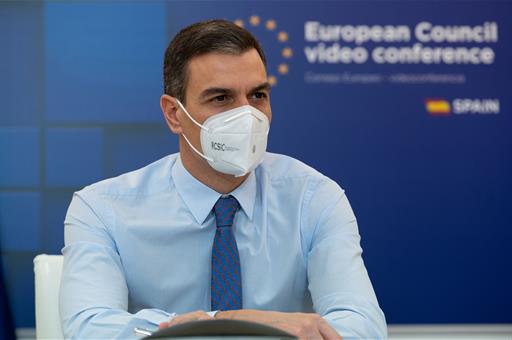President of the Government of Spain takes part in European Council on COVID-19
Pedro Sánchez stresses importance of advancing on vaccination campaign throughout European Union
President's News - 2021.1.21
Moncloa Palace, Madrid
Pedro Sánchez stated that the rate of vaccination in Spain is good, and that we are ready to receive more vaccines. 1,103,301 people - 2.3% of the population - have already received the first dose of the vaccine, above the EU average, and at least 49,056 have received the second dose.
On 19 January, the European Commission asked Member States in a communication to speed up the vaccination process to meet the "ambitious targets" set. In the document, the European Commission called for the EU-27 to vaccinate at least 80% of healthcare professionals and social workers by March, as well as the population over the age of 80 and at least 70% of the adult population by the summer. In this regard, it is considered that to reach these targets, it will be necessary to speed up the production of vaccines. The President of the Government declared that "he trusts that our country will meet these vaccination targets".
The European Commission has coordinated it so that EU countries will have 2.3 billion doses of the vaccines available to them. With the only two vaccines authorised in Europe, 80% of the European population can be vaccinated - some 450 million inhabitants. This figure will rise with the other two vaccines that the European Medication Agency is expected to approve in the coming weeks.
The EU is working at present to ensure that countries establish common measures, with different risk levels, according to the epidemiological situation. Along this line, Spain presented the OECD with a safe international mobility plan in December, taking COVID-19 into account. This multilateral coordination initiative may become a key element in the economic recovery in the wake of the crisis caused by the pandemic.
Member States agreed to accept the European Commission recommendation to step up the use of rapid antigen tests and mutual recognition of the results of PCR tests in all Member States. This is a central tool to help mitigate its spread.
The EU-27 also addressed the possibility of establishing a European vaccination certificate. The President of the Government supports ramping up work to this end, "with a view to its interoperability" and for it to be recognised by all countries.
Pedro Sánchez recalled that the cross-border movement of people is essential for the continuity of companies and other key activities, to which end "finding ways to promote safe international travel must continue to be our priority", but he stressed that this must be done vis-à-vis the Schengen Area and the single market.
Another of the EU's goals is the genome sequencing of variants of the virus. In this regard, Pedro Sánchez highlighted that "we must improve our efforts on sequencing, but in a coordinated fashion".
"The situation is dreadful in our countries. However, we also find ourselves, for the first time, with a powerful weapon in our hands - the vaccine. We have reason to be hopeful", concluded the President of the Government.
Pedro Sánchez highlighted that "Europe is not an island", which is why the Council of Ministers of Spain approved the Solidarity Plan for Universal Access to Vaccination, the main aim of which is to contribute to guaranteeing fair, affordable and universal access to the vaccine. In this regard, the President of the Government recalled the need for citizens in the Western Balkans, Africa and Latin America - " a region that has suffered terribly, both in terms of the number of people who have died and in the social and economic consequences of the crisis" - to have access to the vaccine.
Non official translation





